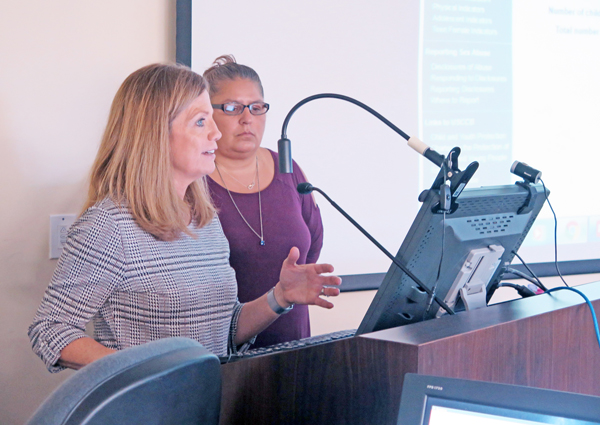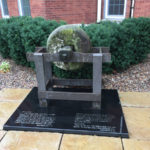By Anne Marie Amacher
The Catholic Messenger
DAVENPORT — The Diocese of Davenport will implement a new safe environment program for youths in grades K-12 starting this fall. “Teaching Safety — Empowering God’s Children” is a program created by Virtus. That organization also provides the adult safe environment program “Protecting God’s Children” for the diocese.

Pat Neal, representative with Virtus, left, and Virginia Trujillo, diocesan safe environment coordinator, talk about the new safe environment program to be taught to K-12 students in the Diocese of Davenport starting this fall.
Virtus offers best-practices programs designed to help prevent wrongdoing and promote “rightdoing” within religious organizations, the Virtus website states. Its programs empower organizations and people to better control risk and improve the lives of all persons who interact with the church.
The diocese has been using Circle of Grace by Dove’s Nest for several years for youths in grades K-12. Virginia Trujillo, diocesan safe environment coordinator, considered other options after visiting schools and parishes to check on compliance with diocesan regulations and the Charter for the Protection of Children and Young People of the U.S. Conference of Catholic Bishops (USCCB).
Trujillo has been working with Pat Neal of Virtus since the diocese adopted the adult program in 2002. “They have worked with us to customize and streamline and make it easier to get information,” Trujillo said.
During a June 28 training session for schools and parishes held at diocesan headquarters and broadcast online, educators learned about the new program, available options, how to record training, and had time to ask questions.
Neal said all the required information and supplements will be accessible online. She also offered options for some videos and information to be provided on DVD or USB drive for those with slower or no internet connections in classrooms. All lessons, activities and supplemental information are grade-based and available in English and Spanish.
She encouraged educators to share the Virtus “Teaching Boundaries and Safety Guide” with parents in a variety of ways. The guide does not replace lessons but can be a supplement at home. One example in the book is teaching children to identify their special safe adults.
Beginning this fall, all schools, parish religious education and youth ministry programs will be required to offer lesson one for grades K-12. The following year, lesson two will be taught. There is overlap with reiteration of some of the basic information from the year before. Students are required to attend one lesson per year.
Within the lessons are a number of activities that educators can choose from to help emphasize the lesson. It is flexible so the adults can tailor the activity to their teaching strengths and to the individual classroom and students.
Each lesson is age appropriate for four specific age groups: K-2, 3-5, 6-8 and 9-12. During the 2018-19 school year, all age groups will focus on safety rules pertaining to touching. The following year the main topic will be safe friends, safe adults and safe touches.
“This is not sex education,” Trujillo emphasized. “It’s about protecting yourself and staying safe.”
Neal said Virtus constantly updates information in lesson plans, activities and supplemental materials. Virtus has teamed up with the Center for Missing and Exploited Children to provide supplemental videos called Kid Smarts. “This has been vetted by the USCCB,” Neal added. The videos cannot replace the required lessons.
Neal and Trujillo explained the changes to record training sessions, which is needed for the annual audit. That documentation shows how many students completed the training, how many were absent and how many parents opted out of having their children participate (that paperwork is kept on file). If a number of students are absent the day of training, Trujillo encouraged a make-up session be held to have as many youths trained as possible.
Training can begin when all schools, religious education and youth groups are up and running in the fall. Paperwork on training must be completed by spring as required by the charter and for auditing purposes.











